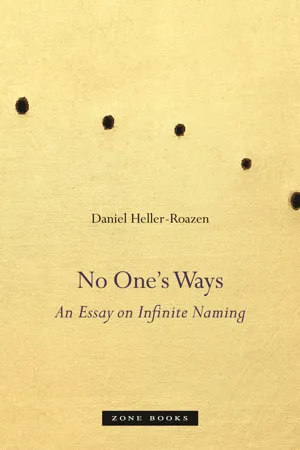
- 336 pages
- English
- PDF
- Available on iOS & Android
About this book
Homer recounts how, trapped inside a monster's cave, with nothing but his wits, Ulysses once saved himself by twisting his name. He called himself Outis: "No One" or "Non-One," "No Man" or "Non-Man." The ploy was a success. He blinded his barbaric host and eluded him, becoming anonymous, for a while, even as he bore a name.
Philosophers never forgot the lesson that the ancient hero taught. From Aristotle and his commentators in Greek, Arabic, Latin, and more modern languages, from the masters of the medieval schools to Kant and his many successors, thinkers have exploited the possibilities of adding "non-" to the names of man.
Aristotle is the first to write of "indefinite" or "infinite" names, his example being "non-man." Kant turns to such terms in his theory of the infinite judgment, illustrated by the sentence, "The soul is non-_mortal." Such statements play unexpected and often major roles in the systems of Salomon Maimon, Hegel and Hermann Cohen, before being variously and profoundly reinterpreted in the twentieth century.
Reconstructing the adventures of a particle in philosophy, Heller-Roazen's book shows how a grammatical possibility can be an incitement for thought. Yet it also draws a lesson from persistent examples. The philosophers' infinite names all point to one subject: us. "Non-man" or "soul," "Spirit" or "the unconditioned," we are beings who name and name ourselves, bearing witness to the fact that we are, in every sense, unnamable.
Frequently asked questions
- Essential is ideal for learners and professionals who enjoy exploring a wide range of subjects. Access the Essential Library with 800,000+ trusted titles and best-sellers across business, personal growth, and the humanities. Includes unlimited reading time and Standard Read Aloud voice.
- Complete: Perfect for advanced learners and researchers needing full, unrestricted access. Unlock 1.4M+ books across hundreds of subjects, including academic and specialized titles. The Complete Plan also includes advanced features like Premium Read Aloud and Research Assistant.
Please note we cannot support devices running on iOS 13 and Android 7 or earlier. Learn more about using the app.
Information
Table of contents
- Contents
- 1 A Guest's Gift
- 2 In the Voice
- 3 Square Necessities
- 4 Varieties of Indefiniteness
- 5 An Imported Irregularity
- 6 Ways of Indeterminacy
- 7 From Empty Words
- 8 Toward the Object in General
- 9 The Infinite Judgment
- 10 Zero Logic
- 11 Non-I and I
- 12 Collapsing Sentences
- 13 The Springboard Principle
- 14 After the Judgment
- 15 A Persistent Particle
- 16 Callings
- Notes
- Bibliography
- Index